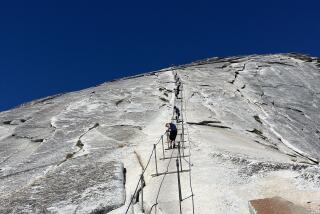The real payoff after Everest
Las Vegas — The bright sun is streaming into Green Valley Ranch Resort as conventioneers file into an auditorium, some slightly hung over, a few munching the bacon and eggs served at the buffet next door.
Two hundred and fifty chairs are occupied when the heavy doors close, sealing the room from the ringing of slot machines outside. Like explorers in a snow-covered valley moments before an avalanche, the audience has no idea what is about to hit them.
The keynote speaker gets introduced but receives only grudging applause from the audience -- clients of the software company Authoria.
The auditorium reverberates with dismissive chatter as a screen on stage fills with a photo of the tallest mountain in the world.
The speaker stands, intensely silent, gazing out at a sea of pasty-skinned desk dwellers. They slowly quiet.
“Good morning.” The words sound almost like a threat.
The room becomes still.
Then the speaker, Jamie Clarke, cracks a smile. “I’m here,” he says, “to talk about how I climbed Mt. Everest.”
Someone in the back of the room suddenly applauds. Another audience member joins in, and then another, until the whole room is clapping.
If you’ve never heard of Clarke, 37, you are in good company. He is the 9th Canadian to have achieved the summit of Mt. Everest, an accomplishment he shares with at least 1,314 other people. His resume, though impressive, doesn’t put him among the world’s most elite climbers.
But for companies searching for the perfect motivational speaker -- someone ready to explain how lessons learned in dangerous locales can help their company maximize shareholder value and vanquish competitors -- the name Jamie Clarke is well known.
“Climbing Everest is about maximizing human potential,” says Todd Chambers, Authoria’s vice president and the person who decided to hire Clarke. “Jamie lets everyone know this conference is about fun and success.”
Some might question the applicability of Clarke’s tutorials -- after all, the average CEO doesn’t need to cross an ice field. And anyone sitting through Clarke’s presentation this day -- in which business topics account for approximately four minutes of an hour-and-a-half talk -- might be forgiven for thinking this is just entertainment.
But motivational speakers say they are integral to corporate America, and businesses such as Authoria are happy to play along. Especially when the reward is a great story about climbing a big mountain. Whether the speeches influence behavior is an open question.
“Companies have focused for so long on maximizing shareholder value that many employees have lost any sense that what they do is meaningful,” says Nitin Nohria, a professor at Harvard Business School and co-author of “Driven: How Human Nature Shapes Our Choices.”
“So companies hire motivational speakers to tap into the unfulfilled parts of people’s souls,” Nohria says. “They make employees feel like what they do is meaningful by comparing sales results to Everest. I don’t think it has lasting impact.”
Adventurepreneur
Clarke is now crossing the stage, sometimes pantomiming climbing, occasionally crouching down and jumping up, his arms pinwheeling as his stories unfold. He is 35 minutes into his presentation and hasn’t said much about Everest yet. He’s explained the advice his mother once gave him about how to kiss a girl. He’s described how he falsified his resume in a failed attempt to join a mountain expedition. He’s finished a detailed account of the gastronomic distress befalling anyone who cooks with yak dung.
In the third row a bald man in a gray suit watches the presentation with a scowl. In the front row a human resources professional from Boston clutches her side with laughter.
Then a photo of colorful Tibetan prayer flags blowing near Everest’s base camp appears on the stage’s screen.
“My sister is a schoolteacher, and when I gave this presentation to her class, one of the little girls asked, ‘Is that your underwear drying?’ ” Clarke says. A small laugh issues from the audience.
“I said no,” Clarke continues. “I explained that during an expedition, we don’t even take our underwear off, much less wash it. Then a boy in the back giggled and shouted out, ‘We don’t take ours off either!’ ”
The crowd explodes. As they say in show business, Clarke kills.
Clarke says he earns $18,000 to $25,000 a speech, and will do 20 to 40 of them a year. He is one of the most sought-after adventure lecturers in the world, according to Shannon Calabrese of Keppler Speakers, the company that represents him.
That popularity is no small feat because competition among adventurepreneurs is fierce. Want a speaker who has lost a limb or confronted cancer and scaled to perilous heights? There are at least 16 who fit the bill. Only interested in climbers who have scaled Earth’s highest mountain? The Everest Speakers Bureau represents 52 mountaineers, some of whom have actually made it to the summit.
“Climbers have been super hot since the 1996 tragedy on Everest” that claimed eight lives, says Warren Wyatt, who represents climbing legend Ed Viesturs. Viesturs, who has summitted Everest six times, addresses about 25 groups a year at $10,000 to $20,000 per appearance.
“Business people love hearing about how their problems are similar to Everest,” says Todd Greene, of the Everest Speakers Bureau, a competitor to Keppler. “It strokes their egos to hear that scaling a corporate ladder is like summitting Everest. So we look for great storytellers.”
Storytelling is a Clarke specialty. He’s written two adventure books and produced a video that he promotes on his website. His business exploits, however, are less pedigreed.
When Clarke announced plans for a chain of “adventure center” retail outlets in 2001, he hired an expensive brand consultant. Company representatives told the magazine Design Week they hoped to roll out 20 stores in San Diego, Seattle, Europe and elsewhere.
Today there’s one store, named Out There, in Clarke’s home of Calgary, Alberta, Canada. Plans for other outposts were shelved. Nevertheless, the outdoor supply company is well-executed and even occasionally profitable. Most important, says Clarke, the store is a lot of fun.
True stories?
Back in the auditorium, Clarke has reached the emotional climax of his speech. He’s describing his second expedition, when a climber collapsed just a few hundred feet from Everest’s summit.
A tape of the climber’s conversation with base camp fills the room. The audience is rapt.
“I can’t go up anymore,” the climber pants on the recording, pausing with every breath, struggling for oxygen. “Not without ... jeopardizing ... my life.”
Clarke then describes how the climber was unable to descend, paralyzed with exhaustion at an altitude that would kill him within hours. The support crew patched his radio signal to a cellphone and called the man’s wife and daughters in the U.S. His two little girls got on the line and pleaded with their father to stand and continue down. The climber did not respond and, in fact, may already have been dead. The woman from Boston in the front row is crying. The man in the gray suit is surreptitiously dabbing at his eyes.
It is a moving story, and it might even be true.
Truth has always been a malleable substance among storytellers. If you wanted to be skeptical, all you had to do was look at Clarke’s website, which described him as placing 11th in the World Junior Nordic cross-country ski championships. According to Toni Scheier, director of the body that oversees the Canadian national championships, Clarke was never on the World Junior Nordic team.
(When questioned by a reporter about this discrepancy, Clarke good-naturedly apologized and explained the inaccuracy was due to an editing error by the website’s designer. The misinformation has since been removed.)
Regardless of the veracity of the tale, the audience is enthralled.
“He listened to his daughters’ voices, and then, his croaked voice answered them,” Clarke says, concluding the endangered climber’s story. “ ‘I’m coming home,’ he told them, and then he came down.”
Reaching the top
After an hour of speaking, Clarke is finally nearing the summit of Everest. He’s explained facetiously how their first expedition failed because they ran out of toilet paper. He’s poked lighthearted fun at Authoria’s CEO, at the company for paying his fee and at motivational speakers as a whole.
Now, he is almost at the top of the elusive mountain. And that’s when it happens: He starts talking about business and loses the audience.
“And when we started crossing that ice field, that’s when I realized that I had to confront my fears. It’s probably the same struggles you face when you consider the competitive landscape or prepare for a meeting with your boss ....”
Clarke continues speaking, demonstrating a savvy insight into recent business developments in corporate America. He mentions a merger in the company’s industry and a popular new management theory. But the audience is fading. A few start checking their Blackberries. The woman from Boston surreptitiously looks at her program to see who is speaking next. These people aren’t here for business information. They want drama.
“And that’s when I realized any of us could die, at any moment,” Clarke says.
The Boston woman’s head snaps up. Everyone else puts away their electronic devices and settles back to hear a great story.
That quickly, the audience is right back with him, ready to cheer Jamie Clarke on to another victorious peak.
Times staff writer Charles Duhigg can be reached at charles.duhigg @latimes.com.
More to Read
Inside the business of entertainment
The Wide Shot brings you news, analysis and insights on everything from streaming wars to production — and what it all means for the future.
You may occasionally receive promotional content from the Los Angeles Times.










